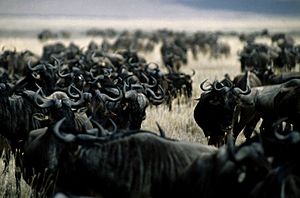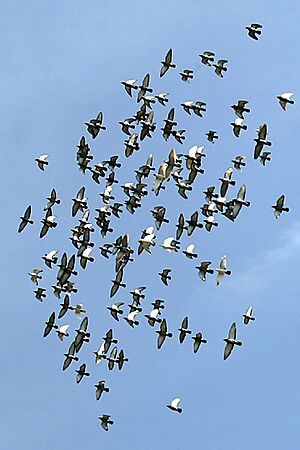Herd facts for kids

A herd is a large group of animals. We usually use the word "herd" for mammals, especially animals with hooves like cows or zebras. When animals form a herd, they often show what is called collective animal behavior. This means they act together as a group.
Other words are used for different types of animal groups. For example, a large group of birds is called a flock. A big group of meat-eating animals, like wolves, is called a pack. Sometimes, there are special names for certain groups. A group of geese on the ground is sometimes called a gaggle.
The word "herd" can also mean a person who looks after these animal groups. For example, a shepherd looks after sheep, and a goatherd looks after goats.
Contents
What is a Herd?
A herd is a group of animals that tends to move and act together. For example, all the animals in a herd might walk in the same direction at the same time. This happens without any planning or special instructions from a leader. Instead, each animal simply chooses to do what most of the other animals are doing. They might copy each other, or they might all be reacting to the same things around them, like a predator or a source of food.
How Herds Behave
Animals in a herd often move together for safety or to find food. When one animal starts to move, others follow. This can make it harder for predators to pick out a single animal. It also helps the group find the best places to eat or drink. Herds can be very large, sometimes with thousands of animals moving across wide areas.
Herds vs. Coordinated Groups
A herd is different from a group where each individual has a special job or role. For example, a sports team or an army has members with different tasks. Some animal groups also work this way. For instance, certain insects, like ants or bees, have very organized groups. They communicate using special chemicals called pheromones to coordinate their actions.
In a herd, animals don't have different jobs. They all do similar things. This is why a herd is seen as a simpler form of group behavior compared to highly organized groups. Sometimes, even human groups can act more like a herd, where people follow what others are doing without much planning.
Related pages
Images for kids
-
A boy herding a flock of sheep in India. This is a classic example of people looking after animals.
-
A snow goose gaggle can have thousands of birds.
See also
 In Spanish: Manada para niños
In Spanish: Manada para niños
 | Jessica Watkins |
 | Robert Henry Lawrence Jr. |
 | Mae Jemison |
 | Sian Proctor |
 | Guion Bluford |






